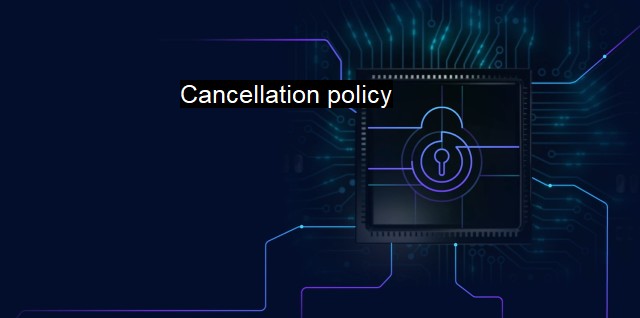What is Cancellation policy?
Understanding Cybersecurity Antivirus Cancelation Policies: Importance and Execution
A cancellation policy is a critical component of any service or product subscription, as it dictates the conditions under which a user can terminate their relationship with a service provider. Within the context of cybersecurity and antivirus protection, the cancellation policy can indeed influence a user's choice of a software or security service provider. Understanding what a cancellation policy is in this context helps the consumer to make informed decisions and prevents potentially frustrating situations in the future.In the realm of cybersecurity and antivirus software, a cancellation policy usually begins the moment a user subscribes to an antivirus or other type of cybersecurity protection service. It outlines the commitments both the provider and user are agreeing to, in terms of length of service, costs involved, and the conditions under which the service can be discontinued.
Many antivirus or cybersecurity service providers offer a range of subscription plans, including monthly, yearly, or even lifetime options. Sometimes, these services are offered with a free trial, allowing the user to test out its effectiveness before making a firm commitment. During this period, the cancellation policy becomes essential, as it outlines the circumstances under which the user can discontinue the service without incurring any costs. If the consumer is not fully satisfied with the functioning of the service, they should, ideally, be able to cancel it in accordance to the stipulated policies.
Cancellation is not always straightforward. Some policies may contain clauses that entail being charged a termination fee or a penalty for cancellation within a certain timeframe, typically known as a 'lock-in' period. Other, more user-friendly policies may allow cancelation at any time during the subscription with prorated refund guarantees, depending on how much the product or service has been used.
The context of cybersecurity adds another layer of complexity. When a user cancels an antivirus subscription, they may worry about the potential exposure to threats in the transition period from one service provider to another. A responsible cancellation policy and a professional antivirus service provider would address such gaps, ensuring seamless and safe service transition, mitigating risk to the customer's digital assets.
It is essential for consumers to thoroughly read the cancellation policy of their cybersecurity or antivirus service provider, as it affects their rights as subscribers. Some providers might also embed auto-renew clauses in their policies, causing them to renew the service agreement automatically without explicit consent from the user. Users must understand when and how they can opt out of this automatic renewal clause to prevent unwanted service continuation and charges.
Adherence to the cancellation policy also contributes to the notion of trustworthiness of the antivirus or cybersecurity provider. It demonstrates that they respect the consumer's right to discontinue the service, ensuring the business relationship is conducted appropriately and in good faith.
The cancellation policy, in the niche of cybersecurity and antivirus services, is a critical document that safeguards the customer's right to discontinue the service. Thriving on a balance between user freedom and business sustenance, it is not just a policy that stipulates cancellation conditions, but an indicator of the service provider's transparency, customer-centrism, and business ethics. The modern cybersecurity-aware customer understands and values this and is seen to factor this into their decision to finalize or terminate an antivirus or cybersecurity service subscription.

Cancellation policy FAQs
What happens if I cancel my anti-virus subscription before it expires?
If you cancel your anti-virus subscription before it expires, you may lose access to the anti-virus software and any associated services. You may also not be eligible for a refund or partial refund, depending on the cancellation policy of the anti-virus provider. It's best to review the cancellation policy before making any changes to your subscription.What are the conditions for cancelling my anti-virus subscription with respect to cybersecurity?
The conditions for cancelling your anti-virus subscription may vary depending on the provider. Some providers may require you to cancel within a certain timeframe or may have specific conditions related to cybersecurity. It's important to review the cancellation policy carefully to understand the conditions and ensure that you comply with them.Can I cancel my anti-virus subscription at any time?
You may be able to cancel your anti-virus subscription at any time, depending on the provider's cancellation policy. However, some providers may have restrictions or requirements for cancelling your subscription, such as canceling during a specific time window or contacting customer support. It's important to review the cancellation policy before making any changes to your subscription.Will I receive a refund if I cancel my anti-virus subscription early?
Whether you receive a refund for cancelling your anti-virus subscription early depends on the provider's cancellation policy. Some providers may offer a prorated refund for unused months, while others may not offer any refund at all. It's important to review the cancellation policy before making any changes to your subscription and to understand the refund policy.| | A | | | B | | | C | | | D | | | E | | | F | | | G | | | H | | | I | | | J | | | K | | | L | | | M | |
| | N | | | O | | | P | | | Q | | | R | | | S | | | T | | | U | | | V | | | W | | | X | | | Y | | | Z | |
| | 1 | | | 2 | | | 3 | | | 4 | | | 7 | | | 8 | | |||||||